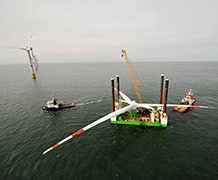Articles

Sources of noise in the ocean include shipping, seismic exploration, and construction activity, such as port extensions or offshore wind farms. Image courtesy of Shutterstock.
University of Exeter contributes to new underwater noise monitoring network
Underwater noise in the marine environment is the focus of a new UK-wide research partnership to monitor the ‘soundscape’ in UK waters. The University of Exeter has teamed up with The Centre for the Environment, Fisheries and Aquaculture Science (Cefas) and Marine Scotland Science to analyse underwater noise data from subsea sound recorders located around the UK coast.
Sources of noise in the ocean include shipping, seismic exploration, and construction activity, such as port extensions or offshore wind farms. There is concern that rising levels of underwater noise pollution worldwide may have an impact on marine life by interfering with communication, causing changes in behaviour, and raising stress levels.
For the first time ever, marine scientists will work together to produce an initial baseline assessment of background noise levels in UK coastal waters, including seasonal and annual patterns, as well as spatial differences. The work, funded by Defra and Marine Scotland, will help to inform the development of a UK-wide noise monitoring strategy, as part of the UK’s commitment to the EU Marine Strategy Framework Directive (MSFD), which seeks to attain Good Environmental Status in European seas by 2020.
A range of government, academic and marine science organisations in the UK are being consulted to scope the potential for a partnership-based approach to establishing a noise-monitoring programme. The findings and recommendations of the project will be available early next year.
Dr Matthew Witt, Lecturer in Natural Environment, University of Exeter’s Environment and Sustainability Institute said: “The University’s involvement in this project is important given our increasing concern regarding the influence of human-derived noise on coastal marine species and habitats. We have been gathering near-continuous information on the marine soundscape in the south west UK since 2012. This Cefas-led project will bring together data from around the UK to improve our understanding of underwater noise and help to advise on how we best manage human activities in the sea while promoting healthy coastal habitats from which we all ultimately benefit”
Cefas Senior Scientist and Project Lead, Dr Nathan Merchant said: “This collaboration between leading UK marine science organisations enables us to share data, expertise and research findings in this increasingly important field. A partnership approach to marine noise monitoring will help us gain a deeper understanding of underwater noise and its impact on the marine environment, as well as providing a more cost-effective solution to establishing a UK-wide monitoring network.”
Dr Ian Davies, Renewables and Energy Programme Manager, Marine Scotland Science said: “Marine Scotland scientists have several years’ experience of monitoring noise levels in the sea, and using underwater noise to research the distribution of key marine mammals species such as bottlenose dolphins and harbour porpoise. An acoustic network for UK seas is an ambitious target best addressed through a partnership approach, and will help us meet international monitoring requirements and also to manage protected marine mammal species.
Date: 22 September 2015
